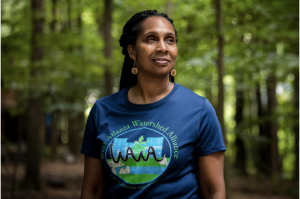
By Clare McCarthy, General Sustainability Intern, Office of Sustainability Initiatives
Dr. Na’Taki Osborne Jelks is a nationally recognized leader of the grassroots environmental justice movement, launching initiatives that have involved and inspired thousands of individuals living in areas where environmental injustices abound.
Her story begins similarly to the stories of individuals whom she today empowers through her work. Dr. Jelks grew up near a chemical plant located on what is known as “Cancer Alley,” an 85-mile stretch between New Orleans and Baton Rouge which contains over 150 heavy industrial facilities. In heartbreaking alignment with this apt nickname, Dr. Jelks’s mother was diagnosed with breast cancer. This was a critical moment for the young Dr. Jelks, as she started to “connect the dots” between her environment—the high pollution index of the air she breathed, and the poor taste and smell of the water she drank—and the health issues of her family. Rather than dwell in anger and pain, Jelks adopted a personal responsibility to “make a difference with [her] own life for communities” (Keating 2020).
From there, Jelks went on to study civil and environmental engineering through a joint program between Spelman College and the Georgia Institute of Technology. She also earned her master’s of public health from Emory University and her Ph.D. from Georgia State University (Spelman College, Faculty Profile n.d.).
Dr. Jelks has made impressive progress in her personal charge, especially with regard to instilling values of environmental stewardship in youth of color. She co-founded the Atlanta Earth Tomorrow Program of the National Wildlife Federation, which empowers inner-city, multicultural teens living in neighborhoods which disproportionately suffer from pollution and economic inequities (Spelman College, Green Leaders n.d.). Today, Jelks also inspires youth as an Assistant Professor of Environmental & Health Sciences at Spelman College.
Furthermore, Dr. Jelks is co-founder and chair of the West Atlanta Watershed Alliance (WAWA), an organization that mobilizes local residents in protecting their greenspace and water quality. WAWA works in a predominantly Black area of Atlanta and with three tributaries of the Chattahoochee River. One of these tributaries, Proctor Creek, especially holds historical significance as a community gathering space, but unfortunately, it is now an urbanized stream impacted by erosion, impervious surfaces, and sewer overflows (West Atlanta Watershed Alliance).
Also holding the role of a community researcher, one of Jelks’s studies focuses on the Proctor Creek Watershed. The study asked ten community members to serve as “watershed researchers” and spend two weeks taking photographs that reflect their experience living in the watershed. These photographs were analyzed for overarching themes about environmental health risks. Overall, the study demonstrates the importance of local knowledge in assessing environmental health threats, as well as identifying community strengths that can be leveraged to address these risks (Jelks et al., 2020).
Another recent study by Jelks focuses on green gentrification, the “influx of wealthier new residents to previously low-income neighborhoods where some greening initiatives are implemented.” The study finds that, while green space offers benefits like promoting physical activity, green gentrification may reduce affordable housing options and marginalized groups’ sense of belonging and safety in the community. The study offers suggestions for addressing these harmful consequences, such as holding recreational programs in new green spaces which are tailored to minority and low-income communities and including residents in the park design process (Jelks et al., 2021).
Overall, Jelks’s work draws attention to a powerful force that holds a complicated place in Black history: water. As Tyler Parry, author for the African American Intellectual History Society notes, although water was once a spiritual symbol in many African religious practices and played a valuable role in helping enslaved people escape from slavery, it has also been “weaponized” against Black communities, for instance, with governmental inaction in the water crisis in Flint, a majority black community (2018). As Parry contends, for Black people to reclaim water as a cultural resource, they must first be empowered to break free from structures that perpetuate environmental injustices. Dr. Jelks’s work rises to meet this call for action, illustrating the necessity of centering community voices in the environmental justice movement to achieve a truly equitable and sustainable future.
Citations
Faculty Profile: Na’Taki Osborne Jelks. (n.d.). Spelman College. Retrieved from https://www.spelman.edu/academics/faculty/directory/profile/na’taki-osborne-jelks
Green Leaders: Na’Taki Osborne Jelks (n.d.). Spelman College. Retrieved from https://www.spelman.edu/about-us/sustainable-spelman/green-leaders/nataki-osbourne-jelks
Keating, C. (2020, April 16). Activist whose mom got sick in ‘Cancer Alley’ fights for ‘healthy environments’ for all. People. Retrieved from https://people.com/human-interest/activist-mom-got-sick-cancer-alley-fights-healthy-environments/
Jelks, N.O., Jennings, V., Rigolon, A. (2021). Green gentrification and health: a scoping review. International Journal of Environmental Research and Public Health, 18(3), https://doi.org/10.3390/ijerph18030907
Jelks, N.O., Smith-Perry, D.J., Fuller, C.H., Stauber, C. (2020). Participatory research in Northwest Atlanta’s Proctor Creek Watershed: Using photovoice to explore environmental health risks at the water’s edge. Health & Place, 66. https://doi.org/10.1016/j.healthplace.2020.102444
Parry, T. (2018, May 4). The role of water in African American history. African American Intellectual History Society. Retrieved from https://www.aaihs.org/the-role-of-water-in-african-american-history/
West Atlanta Watershed (n.d.). West Atlanta Watershed Alliance. Retrieved from http://wawa-online.org/our-watershed/
